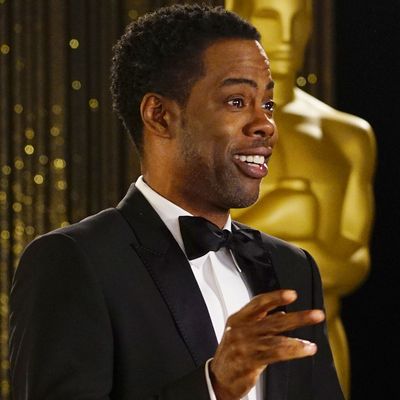
For all the things that might go wrong at this Sunday’s Oscars (“and the winner for Best Picture is … The Revenant!”), there’s one thing that has already gone improbably, undeniably right. In a year when diversity is the biggest issue swirling around the awards, it’s impossible to think of a better Oscars-caliber host to address this issue than Chris Rock. This is astoundingly good fortune for the Academy, given that Rock was named as host way back in October 2015, several months before the all-white acting nominations were revealed. Imagine, if you dare, what a snow-white shitstorm the Oscars would be facing if, for example, Seth MacFarlane were hosting. (That is a thing that actually happened in the past.) Everyone’s talking about a lack of diversity, and MacFarlane is singing about boobs. (That is also a thing that actually happened.) But the question isn’t: How did the Academy managed to dodge this bullet? The real question is: How can the Academy ensure that it replicates this good fortune in the future? The answer: Let the public elect the host.
Okay, I know what you’re thinking: If the host is chosen by popular vote using, say, an online ballot system, this year we’d be looking at an Oscar telecast hosted by either Betty White, Justin Bieber, or Deadpool. (Though each of those scenarios has its merits, if you think about it.) What’s more, an elected host, chosen in the late stages by digital voting, would have only weeks, not months, to prepare for their duties. Then again, when was the last time you watched an Oscar monologue and thought: Boy, you can really see how the months of preparation paid off. People host SNL in a week and that turns out pretty good, mostly. And, to be honest, “pretty good, mostly” is a bar to which recent Oscar telecasts can only aspire.
Now imagine all the upsides of holding a popular vote for host: You, the audience, get to spend four-ish hours on Sunday night with a host you actually like — and, in years like this one, with a host who’s well-suited to captain us through the season’s particular controversies. #OscarsSoWhite? Elect Chris Rock. Female directors shut out yet again? Vote for an Amy Schumer monologue on Oscar night. The ratings for the Oscars have been consistently dropping, and the Academy’s attempts at juicing the numbers by baiting the younglings have ranged from decidedly mixed to notoriously disastrous. Yet with a few simple logistical guidelines, the Academy could let you, the audience, choose the host — and ensure a popular, relevant host, every year.
Here’s how it works: A few weeks before the telecast, the Academy unveils a list of, say, eight candidates. The Academy would put together the short list, thus retaining some control over the potential possibilities (because, again: Deadpool) but it should also be open to candidates suggested in the prior months by the public, through social media. (Start your Hannibal Buress Oscar Host 2017 Oscar hashtag campaign now.) Then these candidates would be presented to the voting public, who’d cast their votes online. Hey, America: Are you feeling a Tina & Amy vibe this year? Or how about Key & Peele? Or Kumail Nanjiani? You don’t even necessarily need to ask the candidates themselves if they want to do it — if someone is voted in, then declines, you simply pass the honor to the next highest vote-getter. Easy!
Once the Oscars open the voting to the people, à la the Major League Baseball All-Star game — and, really, what are the Oscars if not the Hollywood All-Star Game? — we might be just one short year away from the very real possibility of John Oliver as Oscars host, rather than an exhumed mummy hosting for the ninth time. And as accidentally and fortuitously well-suited as Chris Rock is to host this year’s telecast, wouldn’t you like to imagine a system by which we, the people, could conscript Jon Stewart back on-air, if only for an extended cameo? You just know that somewhere, in his ill-timed retirement, Stewart’s writing 300 Trump jokes a day, then dumping them in the East River.
Speaking of Trump, let’s address the ludicrously coiffed, elephant-party-presumptive-nominee in the room. If 2016 has taught us anything so far, it’s that large groups of people can’t be trusted to vote for things. (Democracy: We had a good run.) But wait! While Donald Trump would (will?) make for a terrible president, he’d actually be an intriguing Oscars host, were he chosen. I’m not saying the jokes would be funny, or the show would be, you know, good, but it would definitely be four hours of absolute must-watch TV. If Trump can get you to sit through a four-hour GOP debate when his co-stars are Jeb Bush and John Kasich, don’t tell me you wouldn’t watch him for four hours alongside Brad Pitt and Jennifer Lawrence.
There are other obvious risks to an elect-the-host system: The electorate might anoint some popular but terrible comedian, like Larry the Cable Guy, or the ventriloquist Jeff Dunham, or one of those guys you see on posters in the airport in Vegas but have no idea who they are. Then again, an informed electorate might also choose Stephen Colbert, who’s already shown a canny propensity for the effective mass organizing of online voting, not to mention a knack for boffo event-hosting. Either way, shouldn’t the choice be in our hands — the audience? After all, we’re the ones who have to watch the thing for four hours. The Academy would get the popular host and commensurate ratings it desires, and we get an evening of actual entertainment. This is what’s known — or may well be known after Sunday night — as the Golden Iñarritu: A win-win.




